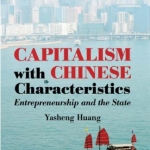Articles tagged with: political economy
Contemporary China, LangYan, Reviews »

Joel Andreas reviews Huang Yasheng’s Capitalism with Chinese Characteristics in the latest New Left Review, which also contains a response from Huang.
Andreas: “Huang’s diagnosis of the maladies afflicting rural China is clearly informed by one of the foundational myths of neo-classical economics—the ideal of competitive capitalism. Free competition, it is assumed, creates a level playing field on which small entrepreneurs naturally flourish. If small entrepreneurs are squeezed out, it must be the fault of the state, which tips the playing field to the advantage of favoured players. The reality is quite different. Market competition intrinsically centralizes property without the need for state intervention. Winners squeeze out losers, amass capital, capture market share and block new entrants. The state often facilitates this process by favouring the winners, but it can also inhibit it by protecting the weaker players. Over the last two centuries, peasants and small rural entrepreneurs have been the main losers as capitalism has swept across the globe.”
International Observer, LangYan »
This is a video of a discussion on China, Japan and the U.S. in the contemporary moment of crisis, which took place in Toronto on Feb. 5, 2010. Participants include: Leo Pantich, R. Taggart Murphy, Ho-fung Hung, Johanna Brenner, and Sam Gindin.
China Studies, Chinese Left, Nihuo Blogs, 中文资料 »
《21世纪》记者吴铭与汪晖谈话
《21世纪》:近年来随着中国国力的显著上升,国际国内舆论对中国道路、中国模式、中国经验等等多有讨论;在新中国60周年大庆到来之际,这些讨论更为频繁。从全球的视野来看,您认为中国这60年来走过的道路是否有其独特性,主要体现在哪些方面?
汪晖:中国经济的发展打破了许许多多的预言——1989年之后,不断地出现中国崩溃论,但就像台湾清华大学的于治中教授说的,中国没有崩溃,而是这些崩溃论崩溃了。人们因此开始总结为什么中国不但没有崩溃,反而获得了发展?在改革过程中,反复出现有关肯定改革与否定改革的讨论,这个讨论也时时涉及如何估价社会主义时期与改革时期的问题。越来越多的人相信,无论如何评价中国的社会主义时期和改革开放的经验,中国的成就是建立在这两个传统的地基之上的。与此同时,眼下的全球金融危机和长期积累的矛盾,也提示中国不能也不应简单地回复到过去发展模式之中——无论是传统的计划模式,还是以GDP增长为唯一目标的发展主义模式。我们需要换一个方式来总结中国六十年来的经验。


